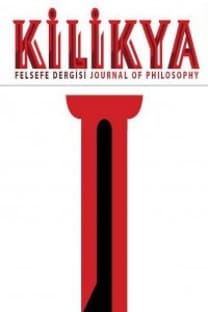MİKHAİL BAKHTİN’İN ÜTOPİK MATERYALİZMİ: KARNAVAL VE DİYALOG BAĞLAMINDA KAİROLOJİK BİR ZAMAN KAVRAMSALLAŞTIRMASI
Bu yazıda Rus filozof Mikhail Bakhtin’in, özellikle karnaval, diyaloji ve grotesk realizm kavramları çerçevesinde, toplumsal ve politik tahayyülüne dair bir tartışma yürütülmeye çalışılmış ve bu kavramların politik içerimlerinin esasen zamansal olarak yüklü olduğu iddia edilmiştir. Bu bağlamda, antik Yunan’daki iki farklı kronolojik (khronos) ve kairolojik (kairos) zaman anlayışı üzerinden, Bakhtin’in zaman ve tarihi politik bir zeminde, karnaval, diyaloji ve grotesk realizm kavramsallaştırması çerçevesinde nasıl ele aldığı gösterilmiştir. Bakhtin’in kronolojik, lineer ve ereksel bir tarih anlayışı karşısında kairolojik bir zamansallık, lineer ve ereksel olmayan bir tarih anlayışı ortaya koyduğu gösterilmeye çalışılmıştır. Bu açıdan Bakhtin’in ütopik bir materyalizmi savunduğu, karnaval, diyaloji ve grotesk realizm kavramlarının da esasen ütopik bir materyalizme ve bir eşik-zamana işaret ettiği ortaya konmaya çalışılmıştır.
MIKHAIL BAKHTIN’S UTOPIC MATERIALISM: A CONCEPTUALIZATION OF KAIROLOGIC TIME IN THE CONTEXT OF CARNIVALE AND DIALOGUE
In this paper, we try to discuss the social and political imagination of the Russian philosopher Mikhail Bakhtin, especially within the framework of the concepts of carnival, dialogue and grotesque realism, and claim that the political implications of these concepts are essentially temporally-loaded. In this context, we show, with reference to two different chronological (khronos) and kairological (kairos) conceptions of time in ancient Greece, how Bakhtin treats the time and history within a political context through the conceptualization of carnival, dialogue and grotesque realism. We argue that Bakhtin conceptualizes a kairological temporality, non-lineer and unteleological understanding of history against the chronological, linear and teleological understanding of history. In this respect, we argue that Bakhtin advocates a utopian materialism and that the concepts of carnival, dialogue and grotesque realism point to a liminal-time.
___
- Bakhtin, M.M. (1981). The Dialogic Imagination (C. Emerson & M. Holquist, Çev.): Austin: University of Texas Press.
- Bakhtin, M. M. (1984a). Rabelais and his World (H. Iswolsky, Çev.). Bloomington: Indiana University Press.
- Bakhtin, M.M. (1984b). Problems of Dostoyevsky’ Poetics (C. Emerson, Çev.). Minneapolis: University of Minnesota Press.
- Bakhtin, M. M. (1986). Speech Genres and Other Late Essays (V. McGee, Çev.). Austin: University of Texas Press
- Benjamin, W. (2003). Paralipomena to ‘On the Concept of History’, Selected Writings, volume 4: 1938-1940 içinde (ss. 401-412). Cambridge: Harvard University Press.
- Deleuze, G. (1990). The Logic of Sense (M. Lester & C. Stivale, Çev.). London: The Athlone Press.
- Gardiner, M. (1992). Bakhtin’s Carnival: Utopia as Critique. Utopian Studies (3) 2, 21-49.
- Gramsci, A. (1971). Prison Notebooks (Q. Hoare & G.N. Smith, Çev.). New York: International Publishers.
- Le Roy Ladurie, E. (1980). Carnival in Romans (M. Feeney, Çev.). New York: Braziller.
- Morson, G.S. & Emerson, C. (1990). Mikhail Bakhtin: Creation of a Prosaic. Stanford, California: Stanford University Press.
- Yayın Aralığı: 2
- Başlangıç: 2014
- Yayıncı: Eray Yağanak
Sayıdaki Diğer Makaleler
ÜST DÜZEY ONTOLOJİ İNŞASINDAKİ FELSEFİ YAKLAŞIMLAR
ADORNO’NUN BİLGİ KURAMI ELEŞTİRİSİNDE HUSSERL FENOMENOLOJİSİNİN YERİ
LEVINAS’IN “AZİZLİK ETİĞİ”NDE HEIDEGGER’İ BAĞIŞLAMA OLANAĞI
DUYU VERİSİ KURAMI VE ALGININ FENOMENAL BELİRSİZLİĞİ
AÇIK SINIRLAR MI KAPALI SINIRLAR MI: İŞTE BÜTÜN MESELE BU MU?
